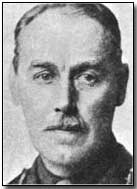Archibald Murray
Sir Archibald James Murray , GCB , GCMG , CVO , DSO (born April 23, 1860 in Kingsclere , Hampshire , † January 21, 1945 in Reigate , Surrey ) was an officer in the British Army , most recently a general , and temporarily chief of the Imperial General Staff . He is best known as the commander of the Egyptian Expeditionary Force in 1916 and 1917 during the Sinai and Palestine campaign in the First World War .
Life
Murray was trained at Cheltenham College and the Royal Military Academy Sandhurst and was inducted into the 27th (Inniskilling) Regiment of Foot in 1879 . From 1886 he was in this regimental adjutant and was promoted to captain the following year . In 1888 he took part in the suppression of a Zulu uprising. After further assignments, he attended Staff College Camberley in 1897 and was promoted to major in 1898 . In the Second Boer War he served in staff assignments under Archibald Hunter and as commander of the 2nd Battalion of the Royal Inniskilling Fusiliers . He received the Distinguished Service Order in that war and was Mentioned in Despatches .
After his return to England he served, among other things, in higher staff assignments in the staff of the 1st Division in Aldershot . In 1907 he became head of military training in the War Office and in 1910 advanced to major general . In December 1912 he became inspector of the infantry and temporarily commanded the 2nd division.
After the outbreak of the First World War, Murray did not become Quartermaster General of the British Expeditionary Force as originally planned , but instead of Henry Hughes Wilson's Chief of Staff. He suffered a physical breakdown while retreating after the Battle of Mons . After constant quarrels with his subordinates, who were used to working under Wilson, he was replaced by William Robertson in late January 1915 .
Murray then became Deputy Chief of the Imperial General Staff under the unrelated James Murray , whom he finally replaced in September 1915. In December 1915 he was ousted again by Robertson from office. His next use was that of the commander-in-chief of the Egyptian Expeditionary Force, which was newly formed after the Gallipoli enterprise was broken up . Despite the sharp reduction in his units in favor of the Western Front , he managed to bring the Sinai Peninsula under control by early 1917 and thus avert the threat to the Suez Canal . Another advance into Palestine failed because of the Turkish resistance in the first two battles for Gaza in spring 1917. In June 1917, Murray was finally replaced by Edmund Allenby , from whom Prime Minister David Lloyd George promised himself the prestigious capture of Jerusalem .
Murray was deported to the post of Commander in Chief of Aldershot Command and held this post until November 1919. In 1922 he retired from active service. Murray had been Honorary Colonel of the Royal Inniskilling Fusiliers since 1911 . He died in 1945 at the age of 84.
Web links
- Biography on firstworldwar.com
| predecessor | Office | successor |
|---|---|---|
| Sir James Murray |
Chief of the Imperial General Staff September to December 1915 |
Sir William Robertson |
| - | Commander in Chief of the Egyptian Expeditionary Force March 1916 to June 1917 |
Sir Edmund Allenby |
| personal data | |
|---|---|
| SURNAME | Murray, Archibald |
| ALTERNATIVE NAMES | Murray, Archibald James |
| BRIEF DESCRIPTION | British general |
| DATE OF BIRTH | April 23, 1860 |
| PLACE OF BIRTH | Kingsclere , Hampshire |
| DATE OF DEATH | January 21, 1945 |
| Place of death | Reigate , Surrey |
